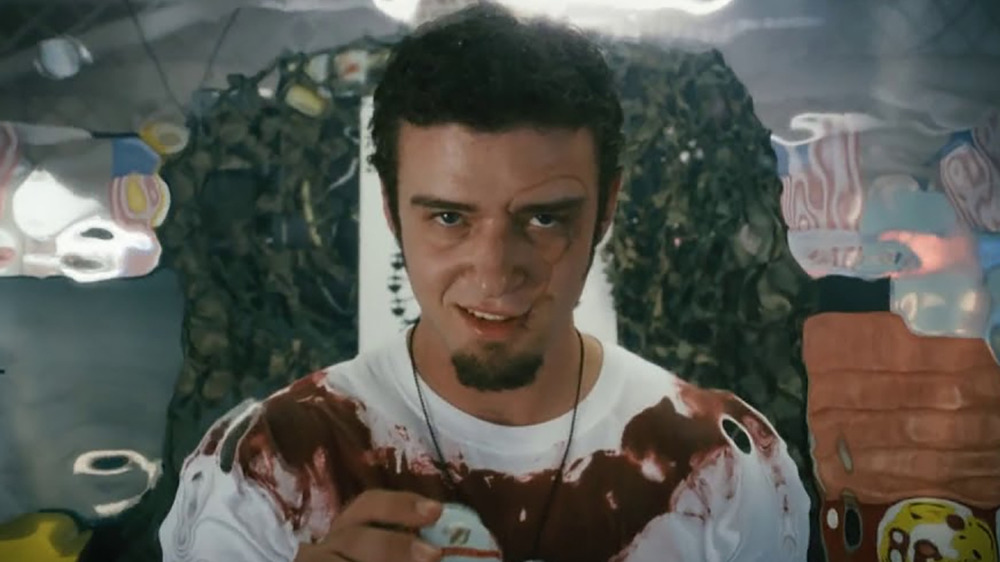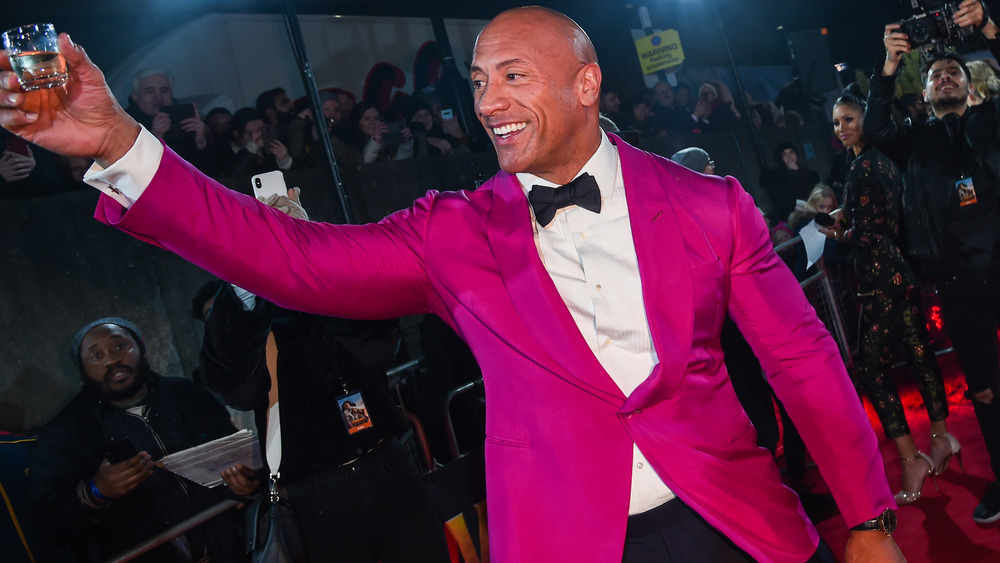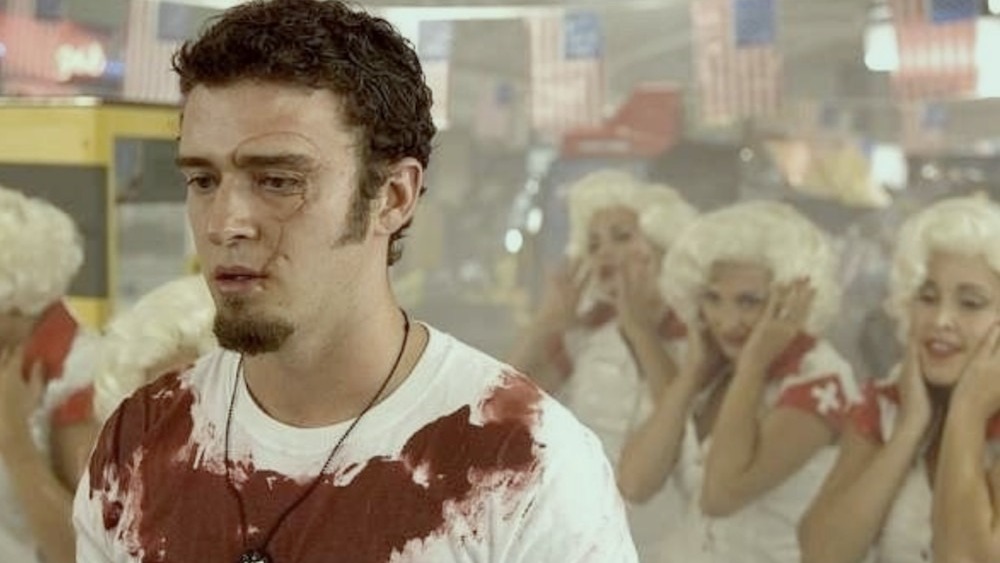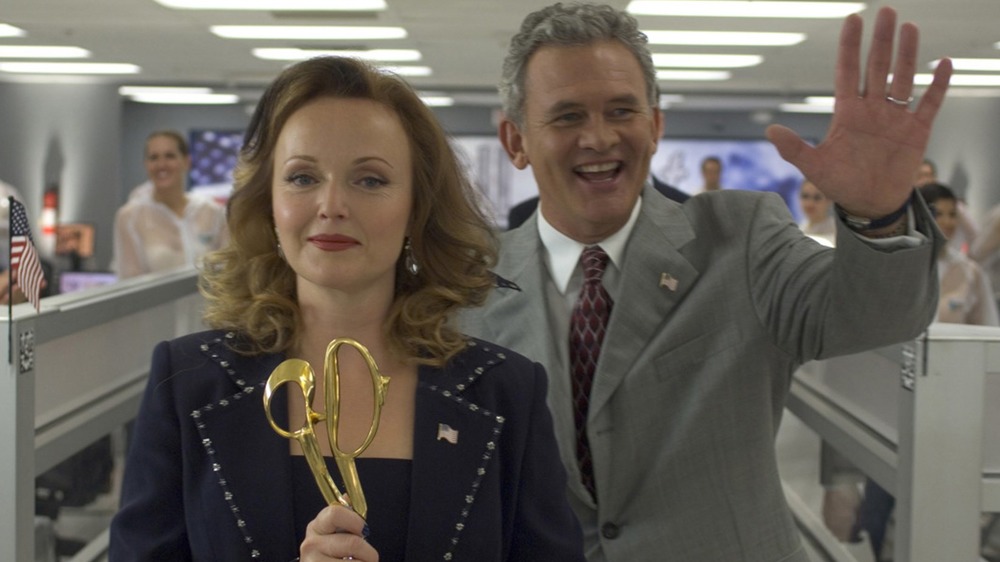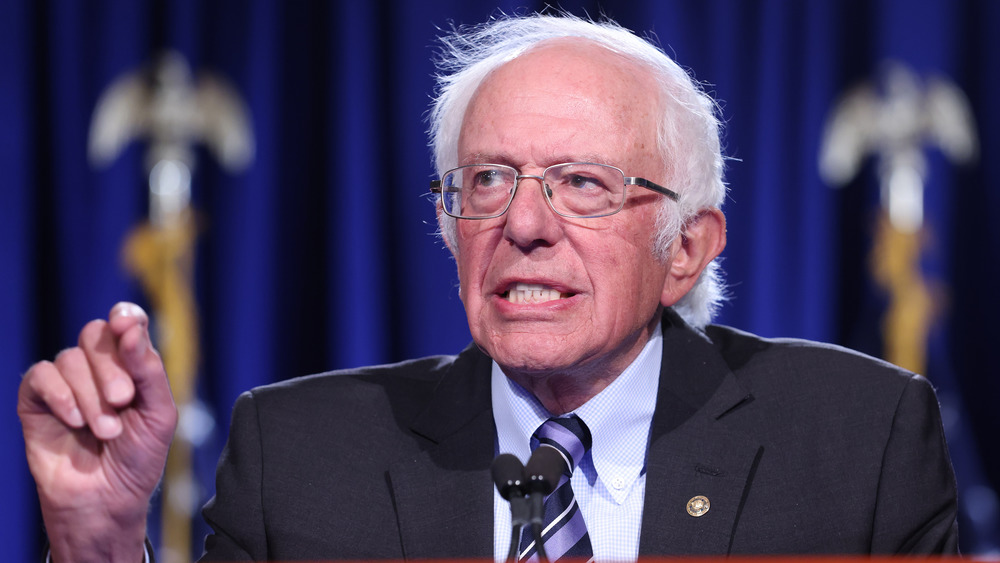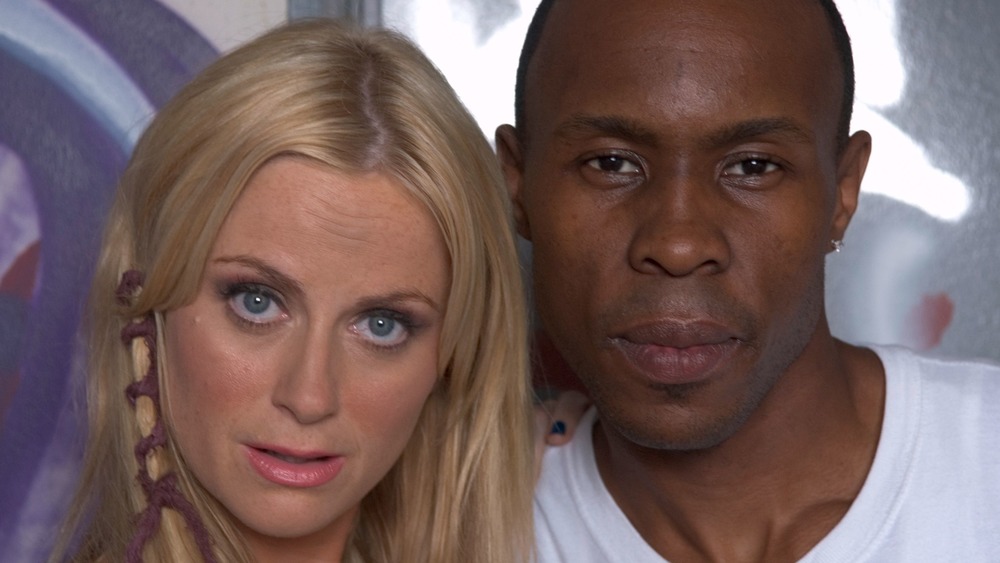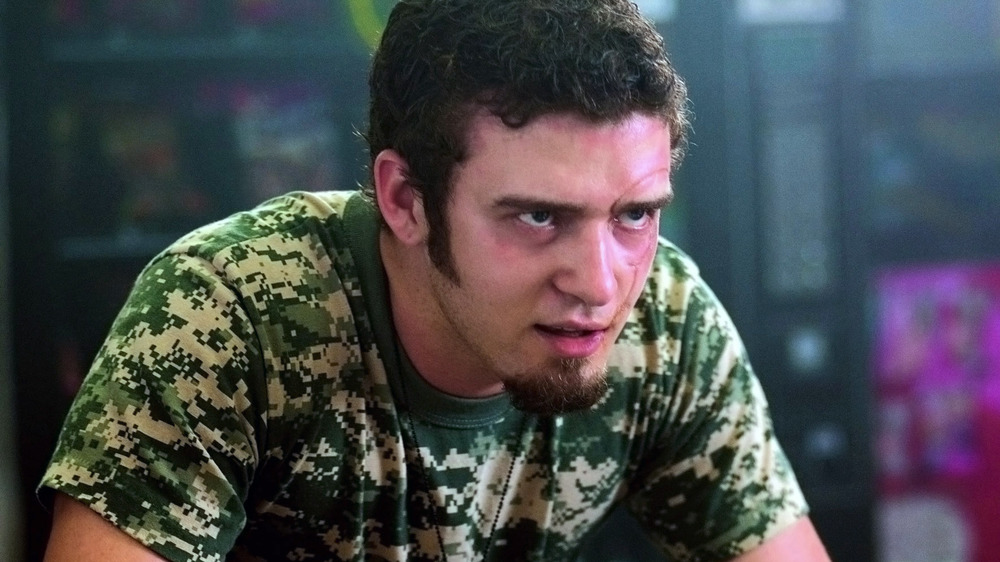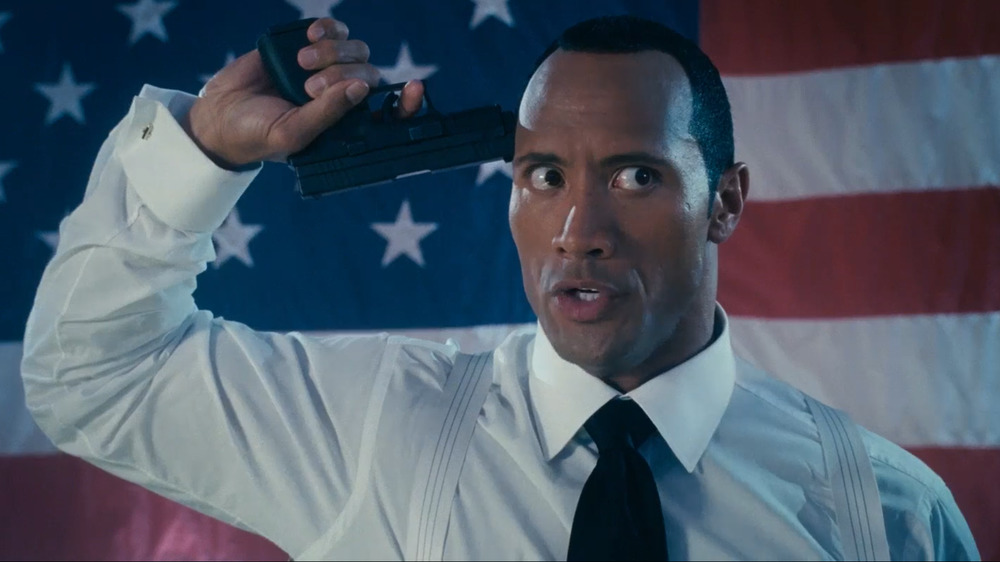How Southland Tales Predicted The Future
Donnie Darko is one of the most debated cult films of the early '00s. Director Richard Kelly incorporated non-linear storytelling, time travel, and an apocalyptic prophecy into his grim fantasy. It confounded viewers and bombed at the box office, then became a big hit on VHS and DVD. Five years later, Kelly introduced the world to his second project, 2006's Southland Tales. It also has time travel and an apocalypse, plus the ambition to become a Dr. Strangelove for the 9/11 generation and a heap of hilarious stunt casting. But while Darko was an initial failure that went on to have a redemptive arc, Southland Tales was brutalized by critics, failed to make $300,000 in its theatrical run, and pretty much disappeared from public consciousness.
But Southland Tales never went away entirely. The movie's fanbase has never approached the size of Darko's, but the film's pure, boldfaced weirdness attracted a following. Also, most of its stars remained famous, which never hurts a film's public awareness. And, curiously, Southland Tales appears to have predicted a handful of contemporary events and circumstances. This raises a question: Did Southland Tales bomb because it came out 15 years too early?
As we're claiming Southland Tales predicted the future, we should probably be more specific. So let's go ahead and do that with this examination of the movie's oddly accurate prophecies.
The Rock is the biggest movie star in the world
In Southland Tales, Dwayne "The Rock" Johnson plays Boxer Santaros, a major movie star who also happens to be the husband of Madeline Frost-Santaros (Mandy Moore). This makes him son-in-law to the influential Senator Bobby Frost (Holmes Osborne).
In 2006, the notion that Dwayne Johnson belonged among Hollywood's elite action stars felt tongue in cheek. Having only appeared in 2002's The Scorpion King, 2005's Be Cool, and a handful of other movies before Southland Tales, the Rock was definitely in the early phase of his wrestling-to-acting career transition. He was still known best for his run in the WWE, which culminated in his emphatic defeat of "Stone Cold" Steve Austin at 2003's Wrestlemania XIX.
To put the situation in contemporary context, casting Dwayne Johnson in Southland Tales was the mid-'00s equivalent of casting John Cena in 2015's Trainwreck. The Southland Tales audience was supposed to recognize Johnson as a wrestler, and that pre-existing knowledge enhanced the underlying humor of Boxer's adventures. Meanwhile, here we are in the modern day, where Johnson's career looks way less like it did during his days of laying the smack down. In fact, it looks a lot like what Richard Kelly imagined for Boxer Santaros. It's unlikely that anyone in the real world could co-author and star in a film that accurately prophesizes the end of human civilization, but if anyone could pull that off, it would certainly be the Rock.
The War In Iraq is still going on
We can't honestly discuss Southland Tales without bringing up contentious political topics of its time, including President George W. Bush and the wars his administration started in the Middle East. Multiple characters in Southland Tales – namely Private Pilot Abilene (Justin Timberlake), Roland Taverner (Seann William Scott), and Simon Theory (Kevin Smith) — are physically and/or emotionally scarred by their time serving overseas.
Many years after Southland Tales debuted and Operation Iraqi Freedom was launched, the U.S. still maintains a military presence in Iraq. The flames of conflict have assuredly risen and fallen throughout the years, but notably, reports show that the number of Iraqi civilian causalities spiked the very same year Southland Tales was released. If Kelly foresaw violence in Iraq getting worse as he composed the Southland Tales screenplay, as it seems likely he did, he was tragically spot on.
The future is much more futuristic than scientists originally predicted
Early in the movie, world-famous porn star and secret psychic Krysta Now (Sarah Michelle Gellar) observes, "Scientists are saying the future is going to be far more futuristic than they originally predicted." That line does a lot of work setting the tone for what follows. Gellar delivers the absurd, apparently meaningless dialogue with absolute earnestness, making the moment emblematic of the movie's sense of humor, and maybe of the totality of Southland Tales.
Krysta's prophecies more-or-less all come true at the film's conclusion — and the one about a futuristic future came to fruition in the real world. Scientists in 2006 definitely didn't predict Space Force, COVID-19, the rise of streaming television platforms, people keeping pigs as domestic pets, the resurgence of vinyl record collecting (which is futuristic in an anachronistic sort of way), the Marvel Cinematic Universe, the spectacular downfall of Charlie Sheen, or many other historical events and elements of modern living that we take for granted.
We suppose nobody knows what the future looks like until it becomes the present, so technically, the future is always going to be more futuristic than anyone originally predicts. Nevertheless, when Krysta Now is right, she's right.
The US-IDent surveillance agency exists today -- we call it social media
Following the 9/11 attacks, in which the Al-Qaeda terrorist network crashed hijacked airplanes into New York City and Washington D.C. on September 11, 2001, killing almost 3,000 people, the U.S. government implemented the USA PATRIOT Act. The "Patriot Act," as it's called, makes it easier for law enforcement agencies to gather surveillance on anyone they suspect of terroristic intentions. Critics of the Patriot Act fear that Americans traded their privacy and individual freedoms away for a perceived increase in safety. Southland Tales encapsulates these anxieties in the form of US-IDent, a state agency that can hear and see everyone in America at all times.
Nowadays, the debate surrounding freedom, privacy, and surveillance continues — albeit in a whole new context with totally different concerns involved. Instead of the U.S. government potentially gathering too much information on too many people, Google, Amazon, and Facebook — private companies that are totally unaccountable to the public — know pretty much everything about each of us.
It's a scary realization to make. But it's also pretty impressive to observe how the US-IDent offices from Southland Tales resemble those of a tech company far more than they do a government or military organization.
Left-wing politics exist on a level they certainly did not in 2006
In Southland Tales, the Republican-controlled government is menaced by a sect of radical Neo-Marxists with Zora Carmichaels (Cheri Oteri), Veronica "Dream" Mung (Amy Poehler) and Cyndi Pinziki (Nora Dunn) operating in independent cells. Meanwhile, the identity of the group's leader remains a mystery — albeit an obvious mystery.
Today, we don't have half-competent freedom fighters who behave like Portlandia characters. But we do have a legitimate and viable left-of-center contingency in American politics that would've seemed inconceivable in 2006. Vermont Senator Bernie Sanders, who advocates for a national single-payer healthcare insurance program and a much more aggressive fight against climate change, would've been considered too left wing for mainstream politics in George W. Bush's America. But in more recent years, he's emerged as a major figure and came close to winning the Democratic Party's nomination for president.
Southland Tales supposes that political polarization becomes more pronounced when one side – in this case, the right wing – gobbles up a disproportionate amount of power. The scenario in the film kinda-sorta played out in real life: We are indeed more polarized nowadays, but convoluted blackmail schemes involving porn stars and tattoo parlors don't enter into it. By and large, cultural shift, the media landscape, and changing demographics are the cause here. That might not be as exciting, but the endpoint sure is similar to the one in Southland Tales.
The debate over police brutality has changed
One of the several subplots weaving around within Southland Tales feels so ahead of its time, it's become insensitive.
Midway through the movie, neo-Marxist performance artists Veronica "Dream" Mung and Dion Element (Wood Harris) plan to fake a racially-motivated police shooting while a movie star related to a conservative senator happens to be on hand, filming the whole incident. Before their pretend-racist cop, Officer Ronald Taverner, gets a chance to pretend-shoot them, a real racist cop (Jon Lovitz) shows up and really kills them both in cold blood.
Considering the deaths of George Floyd, Breonna Taylor, and others sparked nationwide protests in 2020, only a very unwise or essentially sociopathic filmmaker would think a "funny" police shooting scene is a good idea today. But since Dream and Dion's naivete and theatrics are the intended focal point of humor, it seems reasonable to suggest that Southland Tales isn't making light of racialized police violence. Rather, it could be suggesting that well-meaning, artistically-inclined, egotistical (and often white) liberals, like Dream, do not always comprehend the scope of the problems they seek to address. At the risk of behaving as if we can read Richard Kelly's mind, if Southland Tales is trying to tell us America didn't understand the severity of police violence in 2006, history has validated that perspective a few times over.
The line between politics and entertainment has gotten even blurrier
Porn star, pop star, clandestine political activist, and energy drink spokesperson Krysta Now provides the primary celebrity satire in Southland Tales. For historical context, we should explain that major music companies of the early '00s invested significant promotional resources into young, conventionally attractive, blonde female singers whose lyrics included sexually suggestive metaphors. Krysta Now isn't really a parody of a porn star — she's a parody of Britney Spears.
The notion of someone like Spears – an entertainment personality with no experience in public service – becoming an influential figure in national politics sounded laughably absurd in 2006. But in 2020, about 60,000 Americans either filled out a mail-in ballot or traveled to their local polling place and indicated they wanted Kayne West to be the next President of the United States. That's nowhere near enough votes to put him anywhere near the Oval Office. But regardless of how many votes he got, during the last few years, West has played a not-insignificant part in political discourse.
Why do the political opinions of a famous musician who might not be thinking clearly matter? Because we live in a society that values fame above all other attributes. If frequent TV appearances are all that's required to hold high public office, then Krysta Now could absolutely be president.
Fluid Karma is a harbinger of the opiate epidemic
A few of the folks in Southland Tales get absolutely wasted on Fluid Karma, a substance that can fuel an ocean-based power station or get you high as heck. But there's particular focus on the seemingly Fluid Karma-centered lifestyle of wounded Iraq War vet Private Pilot Abilene, whose hallucinatory dance number breaks away from the film's in-story reality.
All kinds of movies depict drug use, but Pvt. Abilene's Fluid Karma-induced haze doesn't look too far removed from the effects of highly potent prescription painkillers and similar substances. A combination of factors contributed to the huge spike in heroin and perception opioid deaths that took place during the early to mid-2010s, but newly emerging research indicates that, sure enough, combat veterans of the wars in Iraq and Afghanistan are seven times more likely to abuse so-called "downers."
Pvt. Abilene is played by pop star Justin Timberlake who, in his zonked-out fantasy, is surrounded by beautiful women in skin-tight nurse outfits while he sings along to The Killers' "All These Things That I've Done." As the song winds down, Pvt. Abilene undergoes a mood swing, loses his swagger, and gazes somberly at the floor. What Southland Tales shows us is nowhere near as depressing and unglamorous as real life opiate addiction. But does it get about as close as a Hollywood comedy can to the reality of this crisis, without turning into Requiem for a Dream? Could be.
Southland Tales is also wrong about a bunch of stuff
In order to make ourselves perfectly clear, we should emphasize that Southland Tales did not predict every element of modernity. At all. It's actually way off about a bunch of stuff.
For instance, while the Bush-era wars continue to this day, the government never reinstated the draft to keep the soldier supply fresh. There hasn't been an international terrorist attack on the scale of the 9/11 since, well, 9/11. Of course, there have been plenty of terrorist attacks and other substantial national tragedies since 9/11. But we're talking hyper-specifically about a foreign-based terrorist organization successfully targeting an American city with nuclear bombs. That part of Southland Tales definitely didn't happen in real life, so luckily, nothing akin to the nuclear annihilation of major Texas cities, as happens in the film, has occurred.
The life of the real world's Britney Spears is much stranger than anything that occurs in any Richard Kelly movie. Scientists haven't figured out how to replace fossil fuels by slowing down the rotation of the Earth either, and, to be honest, we're not expecting them to come through with that anytime soon. Perhaps most importantly, when life as we know it ceases to continue, we feel confident predicting that the proceedings will not involve Seann Williams Scott in any way. Although they might have something to do with the Rock ...
